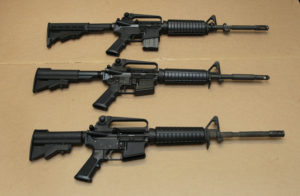

A Connecticut judge threw out a lawsuit by families of victims of the 2012 Sandy Hook school shooting, a major victory for the gun industry and in particular Remington Arms Co., maker of the assault weapon used in the massacre of 20 children and six educators.
Judge Barbara Bellis dismissed the case Friday in state court in Bridgeport, ruling the company is protected by a 2005 federal law that shields gun manufacturers from such lawsuits.
Under the Protection of Lawful Commerce in Arms Act, or PLCAA, gun companies can’t be held liable for crimes committed with their products. The statute, backed by the National Rifle Association, has helped the industry defeat many such cases, with the Sandy Hook suit the latest and perhaps most high profile example.
The massacre at Sandy Hook Elementary School was caused “solely by the criminal misuse of a weapon by Adam Lanza,” Bellis said, referring to the shooter who killed himself after carrying out the attack. “Accordingly, this action falls squarely within the broad immunity provided by PLCAA.”
“While the families are obviously disappointed with the judge’s decision, this is not the end of the fight,” their attorney, Josh Koskoff, said in a statement. “We will appeal this decision immediately and continue our work to help prevent the next Sandy Hook from happening.”
The lawsuit is seen as a test case for potential legal maneuvers around the federal law, which has been under attack by legislators and activists who believe easy access to guns is to blame for continued mass shootings in the U.S., including the June massacre of 49 people at a nightclub in Orlando, Florida, with a similar assault rifle.
Connecticut Governor Dannel Malloy, an outspoken critic of the federal law at the center of the case, said he was disappointed with the ruling.

“The laws providing unique protections to gun manufacturers need to be changed to give crime victims a right to pursue legal remedies,” Malloy said in a statement after Friday’s decision.
The families’ claim hinged on an exception to the law that applies when a seller “negligently entrusts” a weapon to a buyer who is likely to use it in a crime. Remington argued the exception is intended to apply to face-to-face transactions involving retailers and individuals — not to manufacturers.
The families had argued Bushmaster Firearms International, maker of the rifle, and parent Remington should have known that mass shootings like the 2012 attack might result from selling military-grade weapons with 30-round clips to civilians. The plaintiffs argued that such knowledge was equivalent to a gun retailer selling a weapon to a customer who they knew was likely to commit a crime. The judge disagreed.
The question of whether the AR-15 should be sold to the public should be dealt with by legislators rather than juries, the company has argued.
Assault weapons were banned in Connecticut after the Sandy Hook shooting. In June, the U.S. Supreme Court declined to hear a challenge to the law. A federal ban on such weapons was passed in 2004 and expired a decade later. Renewed efforts by mostly Democratic lawmakers to reinstate it have repeatedly failed.
The case is Soto v. Bushmaster Firearms International LLC, 15-cv-6048103, Connecticut Superior Court (Bridgeport).
Related: